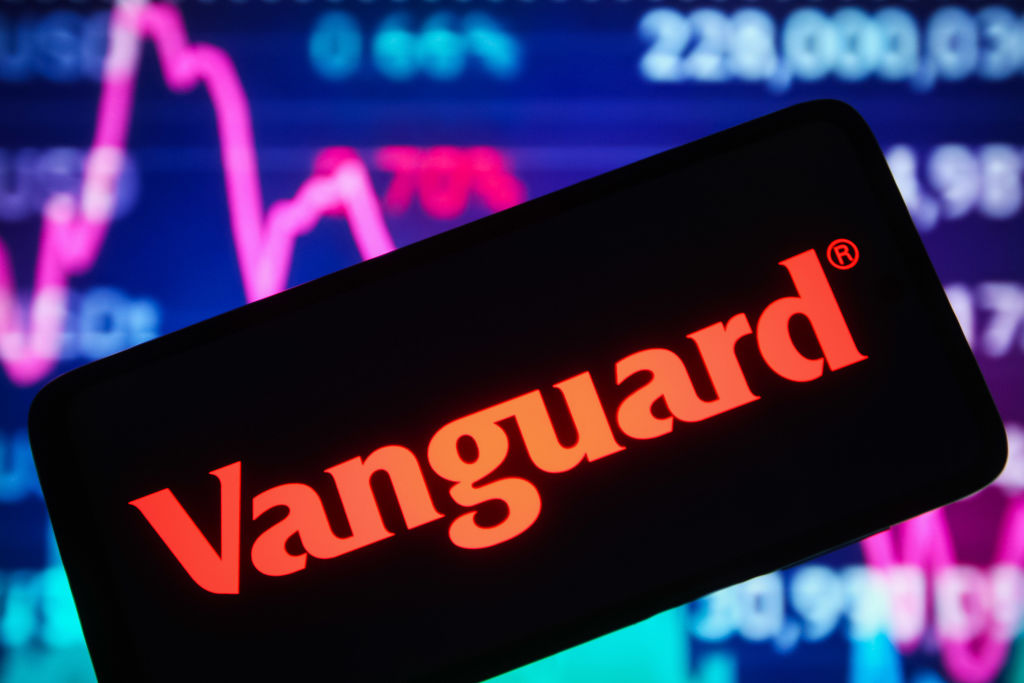4 Highly Rated Vanguard Dividend and Income Funds
These four low-cost Vanguard dividend and income funds have all earned high praise from Morningstar, and they offer attractive yields.


Profit and prosper with the best of Kiplinger's advice on investing, taxes, retirement, personal finance and much more. Delivered daily. Enter your email in the box and click Sign Me Up.
You are now subscribed
Your newsletter sign-up was successful
Want to add more newsletters?

Delivered daily
Kiplinger Today
Profit and prosper with the best of Kiplinger's advice on investing, taxes, retirement, personal finance and much more delivered daily. Smart money moves start here.

Sent five days a week
Kiplinger A Step Ahead
Get practical help to make better financial decisions in your everyday life, from spending to savings on top deals.

Delivered daily
Kiplinger Closing Bell
Get today's biggest financial and investing headlines delivered to your inbox every day the U.S. stock market is open.

Sent twice a week
Kiplinger Adviser Intel
Financial pros across the country share best practices and fresh tactics to preserve and grow your wealth.

Delivered weekly
Kiplinger Tax Tips
Trim your federal and state tax bills with practical tax-planning and tax-cutting strategies.

Sent twice a week
Kiplinger Retirement Tips
Your twice-a-week guide to planning and enjoying a financially secure and richly rewarding retirement

Sent bimonthly.
Kiplinger Adviser Angle
Insights for advisers, wealth managers and other financial professionals.

Sent twice a week
Kiplinger Investing Weekly
Your twice-a-week roundup of promising stocks, funds, companies and industries you should consider, ones you should avoid, and why.

Sent weekly for six weeks
Kiplinger Invest for Retirement
Your step-by-step six-part series on how to invest for retirement, from devising a successful strategy to exactly which investments to choose.
Whenever we write about Vanguard funds, the conversation always quickly shifts to fees.
Vanguard has long been a pioneer in low-cost investing, and to this day, one of the biggest selling points of its investment funds is its bargain-basement expense ratios.
But today, rather than talk about how much we'll pay Vanguard, let's discuss how much Vanguard can pay us.
Investors who want to build up the income portion of their portfolio often do so via funds.
As my colleague Kent Thune puts it, "If dependable income is a priority, you probably also value stability – and a diversified bundle of holdings will provide much more of that than a few individual stocks."
With this in mind, we're going to delve into four Vanguard dividend and income funds that fit the bill, boasting low fees, above-average yield and high ratings.
Specifically, all four of these funds have earned Gold Medalist ratings – a forward-looking tiered system that Morningstar uses to express its confidence in whether a fund is able to beat its category index.
The minimum initial investment for each of these funds is $3,000. We'll also include the corresponding Vanguard ETF.
Data is as of October 17. Yields on equity funds represent the trailing 12-month yield. Yields on bond funds are SEC yields, which reflect the interest earned after deducting fund expenses for the most recent 30-day period.

Vanguard High Dividend Yield Index Fund Admiral Shares
- Fund category: Large value
- Assets under management: $81.3 billion
- Yield: 2.5%
- Expense ratio: 0.08%, or $8 annually for every $10,000 invested
We'll get the most obvious cash cow out of the way first.
The Vanguard High Dividend Yield Index Fund Admiral Shares (VHYAX) is built for big, beefy yields. In fact, at the moment, it's the highest-paying Gold-rated equity income fund in Vanguard's arsenal.
VHYAX tracks the FTSE High Dividend Yield Index, which includes companies with a history of paying above-average dividends.
The index is built by ranking the stocks in the FTSE USA Index by their expected 12-month dividend yield and selecting the highest-yielding 50% of the eligible stocks.
It then weights those stocks by float-adjusted market capitalization (bigger companies represent greater shares of the fund's assets).
"Market-cap-weighting also emphasizes larger, more-stable firms that should have the capacity to continue making dividend payments," says Morningstar Director Bryan Armour. "This mitigates the impact of value traps because their weight drops as their prices fall.
"Leaning toward stable companies comes at the cost of maximizing dividend yield," he adds. "But the fund's yield still typically surpasses the Russell 1000 Value Index by about 1 percentage point."
VHYAX currently holds nearly 570 stocks, with double-digit allocations to financials, technology, health care, industrials and consumer staples – in other words, some of the sectors you'd expect, but some you wouldn't.
It's a haven for blue-chip dividend stocks such as Procter & Gamble (PG), Home Depot (HD) and Walmart (WMT). At the same time, its top holding is chipmaker Broadcom (AVGO).
Curiously, missing entirely from the fund is an allocation to real estate investment trusts (REITs); these well-known payers of high dividends are explicitly excluded from the index.
Still, you're getting a 2.5% yield from what is among the most basic funds from this asset manager. That's far more than you're getting from the S&P 500 right now, and better than most other large-cap value-oriented funds.
VHYAX is also available in ETF format: The Vanguard High Dividend Yield ETF (VYM), which charges 0.06%.

Vanguard Small Cap Value Index Admiral Shares
- Fund category: Small value
- Assets under management: $59.1 billion
- Yield: 2.0%
- Expense ratio: 0.07%
You'll typically find higher-than-normal yields in value strategies, which typically favor sectors that are known for having generous payers.
But it'd be a little overkill to suggest the Vanguard Value Index Fund Admiral Shares (VVIAX) to complement VHAYX when both are large-cap value funds.
So why not go small instead?
The Vanguard Small Cap Value Index Admiral Shares (VSIAX) tracks the CRSP US Small Cap Value Index, which includes small-cap stocks that are considered value stocks based on five criteria:
- Book-to-price
- Forward earnings-to-price
- Historical earnings-to-price
- Dividend-to-price
- Sales-to-price
(Why does CRSP use backwards versions of price-to-book and price-to-earnings? Only The Shadow knows!)
The resulting portfolio is a wide 840 small-cap stocks, weighted by market cap. And like most similarly weighted small-cap funds, concentration risk is effectively negligible, as even the top holdings account for less than 1% in assets apiece.
At the moment, 38% of assets are split between industrial stocks and financial stocks alone; consumer discretionary is the only other double-digit weighting, at 13%. (And yes, you get REITs in this fund – a healthy 10% weighting, in fact.)
Why does VSIAX earn Gold from Morningstar? Says analyst Zachary Evens: "Its broad diversification and razor-thin expense ratio make this one of the best small-cap value funds available."
VSIAX is also available in ETF format: The Vanguard Small-Cap Value ETF (VBR), which charges 0.07%.

Vanguard Short-Term Corporate Bond Index Fund Admiral Shares
- Fund category: Short-term bond
- Assets under management: $46.2 billion
- Yield: 4.2%
- Expense ratio: 0.06%
Moving on to the fixed-income side of things, we'll look at two different bond funds: one focused more on safety, and one focused on pushing the pedal to the high-yield metal.
The Vanguard Short-Term Corporate Bond Index Fund Admiral Shares (VSCSX) tracks the Bloomberg U.S. 1-5 Year Corporate Bond Index, which is made up of U.S. dollar-denominated, investment-grade bonds issued by both U.S. and non-U.S. companies, with maturities of between one and five years.
One of the more confusing aspects of the fund is that the index says it only pulls bonds from three sectors: industrials, financials and utilities. And indeed, the weighting is 50.1 industrial, 42.3% financial, 6.6% utilities and 1.0% "other."
But if you actually delve into the holdings, you'll find that there are many, many holdings outside of those sectors. What gives?
Vanguard representatives state that the sectors listed for VSCSX don't work like normal stock-market sectors. For instance, consumer discretionary stocks might be listed as industrials, and telecoms might be listed as utility stocks.
So you're actually getting a much wider scope of the corporate bond market than it might seem – indeed, top-10 holdings include bonds from financials including Bank of America (BAC) and Wells Fargo (WFC), but also from health care stocks such as Amgen (AMGN) and AbbVie (ABBV) and telecom Comcast (CMCSA).
The portfolio's credit quality is good (albeit not spectacular), with 45% of assets in BBB-rated bonds (the lowest investment-grade rating), 47% in A-rated bonds, 7% in AA-rated bonds, and the thin remainder in AAA-rated bonds.
"Many funds in this category have wider mandates that include government and securitized bonds, which the fund omits by definition," says Morningstar analyst Lan Anh Tran.
"Compared to the category average, the fund consistently underweights Treasuries and agency bonds by a wide margin," she adds. "This pulls its credit risk profile into more aggressive territory."
Still, the average effective maturity of the portfolio is a low 2.9 years, which helps tamp down risk. All told, duration is a fairly low 2.7 years.
"[Duration is] a measure of a bond's interest-rate sensitivity," say Kiplinger's Dan Burrows and Anne Kates Smith in their feature on the 10 things to know about bonds.
"As a general rule, for every [1-percentage-point] increase or decrease in interest rates, a bond's price will change approximately 1% in the opposite direction for every year of duration," they add.
So in VSCSX's case, a 1-percentage-point increase in rates would result in a 2.7% decline in the fund's price, and vice versa. That's a modest amount of risk for what is a pretty high yield on the Vanguard Short-Term Corporate Bond Index right now.
While we can't track SEC yield (the optimal measurement for bond funds) over time, we can track trailing 12-month yield. It's not perfect, but it gives us some historical perspective.
And at least on a TTM yield basis, VSCSX is delivering more yield than it has since its 2010 inception.
That makes Vanguard's short-term corporate bond fund both an ideal hiding place for cash you're waiting to deploy, and even a lower-risk source of decent yield if you're investing for retirement.
VSCSX is also available in ETF format: The Vanguard Short-Term Corporate Bond ETF (VCSH), which charges 0.03%.

Vanguard Emerging Markets Government Bond Index Fund Admiral Shares
- Fund category: Emerging-markets bond
- Assets under management: $5.5 billion
- Yield: 6.1%
- Expense ratio: 0.20%
If you want to pull down some serious income, you might need to take on a touch more risk than short-term, high-quality government bonds.
Instead, you might need to broaden your horizons … say, to exotic locales such as Saudi Arabia, Mexico, Turkey and Indonesia.
Those are some of the emerging markets whose bonds are held by the Vanguard Emerging Markets Government Bond Index Fund Admiral Shares (VGAVX).
VGAVX tracks the Bloomberg USD Emerging Markets Government RIC Capped Index, which is made up of dollar-denominated bonds with more than one year until final maturity that are issued by emerging-market governments, government agencies and government-owned corporations.
The fund's assets are shared among the fixed-income issues of more than 60 countries, though they're hardly scattered evenly.
The aforementioned four countries, for instance, collectively represent 38% of the fund's weight. Others, including the Bahamas, Bulgaria and Benin, command just 0.1% apiece.
If you haven't examined emerging-market bond funds before, you might assume that the credit quality is quite low. But it's not so! More than half of the portfolio is rated investment-grade, and about a quarter is A-rated or better.
Another quarter of assets are in bonds rated BB, which is the highest below-investment-grade ("junk") rating.
For comparison's sake, the quality isn't as high as what we get in VSCSX. Bond length is riskier, too – the portfolio's average effective maturity is a long 11.5 years.
Understandably, then, the Vanguard Emerging Markets Government Bond Index features a high duration of 7.0 years, which means a 1-percentage-point hike in rates would theoretically knock VGAVX's share price 7.0% lower … but a similar drop in rates would result in a sizable 7% gain.
And VGAVX compensates us for this added risk, in the form of a downright juicy 6%-plus yield.
Morningstar's commentary on relatively lesser-traveled funds (even $5.5 billion is "small" in some circles) tends to be on the light side, but its praise for this Gold-rated bond fund largely rests on a "sensible investment philosophy" and "a sizable cost advantage over competitors."
Indeed, its 0.20% annual fee is less than a quarter of the category average 0.83% expense ratio, and easily rates in the lowest quintile of category funds by cost.
VGAVX is also available in ETF format: The Vanguard Emerging Markets Government Bond ETF (VWOB), which charges 0.15%.
Learn more about VGAVX at the Vanguard provider site.
Related content
Profit and prosper with the best of Kiplinger's advice on investing, taxes, retirement, personal finance and much more. Delivered daily. Enter your email in the box and click Sign Me Up.
Kyle Woodley is the Editor-in-Chief of WealthUp, a site dedicated to improving the personal finances and financial literacy of people of all ages. He also writes the weekly The Weekend Tea newsletter, which covers both news and analysis about spending, saving, investing, the economy and more.
Kyle was previously the Senior Investing Editor for Kiplinger.com, and the Managing Editor for InvestorPlace.com before that. His work has appeared in several outlets, including Yahoo! Finance, MSN Money, Barchart, The Globe & Mail and the Nasdaq. He also has appeared as a guest on Fox Business Network and Money Radio, among other shows and podcasts, and he has been quoted in several outlets, including MarketWatch, Vice and Univision. He is a proud graduate of The Ohio State University, where he earned a BA in journalism.
You can check out his thoughts on the markets (and more) at @KyleWoodley.
-
 Ask the Tax Editor: Federal Income Tax Deductions
Ask the Tax Editor: Federal Income Tax DeductionsAsk the Editor In this week's Ask the Editor Q&A, Joy Taylor answers questions on federal income tax deductions
-
 States With No-Fault Car Insurance Laws (and How No-Fault Car Insurance Works)
States With No-Fault Car Insurance Laws (and How No-Fault Car Insurance Works)A breakdown of the confusing rules around no-fault car insurance in every state where it exists.
-
 Why Picking a Retirement Age Feels Impossible (and How to Finally Decide)
Why Picking a Retirement Age Feels Impossible (and How to Finally Decide)Struggling with picking a date? Experts explain how to get out of your head and retire on your own terms.
-
 The Best Precious Metals ETFs to Buy in 2026
The Best Precious Metals ETFs to Buy in 2026Precious metals ETFs provide a hedge against monetary debasement and exposure to industrial-related tailwinds from emerging markets.
-
 For the 2% Club, the Guardrails Approach and the 4% Rule Do Not Work: Here's What Works Instead
For the 2% Club, the Guardrails Approach and the 4% Rule Do Not Work: Here's What Works InsteadFor retirees with a pension, traditional withdrawal rules could be too restrictive. You need a tailored income plan that is much more flexible and realistic.
-
 Retiring Next Year? Now Is the Time to Start Designing What Your Retirement Will Look Like
Retiring Next Year? Now Is the Time to Start Designing What Your Retirement Will Look LikeThis is when you should be shifting your focus from growing your portfolio to designing an income and tax strategy that aligns your resources with your purpose.
-
 I'm a Financial Planner: This Layered Approach for Your Retirement Money Can Help Lower Your Stress
I'm a Financial Planner: This Layered Approach for Your Retirement Money Can Help Lower Your StressTo be confident about retirement, consider building a safety net by dividing assets into distinct layers and establishing a regular review process. Here's how.
-
 Stocks Sink With Alphabet, Bitcoin: Stock Market Today
Stocks Sink With Alphabet, Bitcoin: Stock Market TodayA dismal round of jobs data did little to lift sentiment on Thursday.
-
 The 4 Estate Planning Documents Every High-Net-Worth Family Needs (Not Just a Will)
The 4 Estate Planning Documents Every High-Net-Worth Family Needs (Not Just a Will)The key to successful estate planning for HNW families isn't just drafting these four documents, but ensuring they're current and immediately accessible.
-
 Love and Legacy: What Couples Rarely Talk About (But Should)
Love and Legacy: What Couples Rarely Talk About (But Should)Couples who talk openly about finances, including estate planning, are more likely to head into retirement joyfully. How can you get the conversation going?
-
 How to Get the Fair Value for Your Shares When You Are in the Minority Vote on a Sale of Substantially All Corporate Assets
How to Get the Fair Value for Your Shares When You Are in the Minority Vote on a Sale of Substantially All Corporate AssetsWhen a sale of substantially all corporate assets is approved by majority vote, shareholders on the losing side of the vote should understand their rights.

